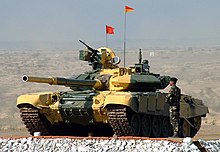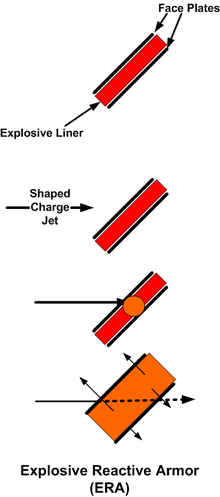
Kontakt-5 is a type of second-generation explosive reactive armour (ERA) originating in the Soviet Union. Due to the shortcomings of Kontakt-1, NII Stali developed a new type of reactive armor, Kontakt-5, so that it also affects the penetration characteristics of APFSDS projectiles, unlike Kontakt-1. In addition, Kontakt-5 is not just additional armor, but is clearly integrated into the vehicle hull. The Kontakt-5 modules have a significantly thicker steel upper side. Depending on the module, they contain one or two 4S22 reactive elements. The explosive of a 4S22 element has the TNT equivalent of 330 g. It is sensitive enough to be activated by impacts from armor-piercing projectiles as well as shaped charge warheads. Kontakt-5 produces a stronger defensive detonation than Kontakt-1 and the thicker steel flyer plate thrown at the APFSDS projectile breaks or bends it. The increase in defensive capability led to the development of more advanced APFSDS projectiles.
Kontakt-5 was first observed on a T-80U in 1985. Later, the T-72B, T-84 and T-90 tanks were also equipped with Kontakt-5. In addition, the T-55, T-62 and BMP-3 tank models can also be equipped or upgraded with Kontakt-5. According to the manufacturer, Kontakt-5 is the first type of reactive armor that effectively protects armored vehicles against tandem shaped charges.
Total mass of Kontakt-5 reactive armor: 2.8 - 3.0 t, Protective effect (RHA equivalent): against APFSDS: 200 - 250 mm, against shaped charges (HEAT): 600 mm,
Description

Introduced on the T-80U tank in 1985, Kontakt-5 is made up of "bricks" of explosive sandwiched between two metal plates. The plates are arranged in such a way as to move sideways rapidly when the explosive detonates. This forces an incoming kinetic energy penetrator or shaped charge jet to cut through more armour than the thickness of the plating itself since "new" plating is constantly fed into the penetrating body. A kinetic energy penetrator is also subject to powerful sideways forces which may cut the rod into two or more pieces. This significantly reduces the penetrating capabilities of the penetrator, since the penetrating force will be dissipated over a larger volume of armour.
Newer KE penetrators like the US M829A3 were "driven by the need to counter KE-effective explosive reactive armor (ERA)".
Relikt was designed by the Russian army in response to the new developments. Relikt is the 3rd generation of Russian ERA, and is claimed to be twice as effective as Kontakt-5. It can be installed on T-72B and T-90 tanks and was adopted in 2006. The Russian Army T-72B3M main battle tank incorporates Relikt. Developed by NII Stali, Relikt uses a completely new composition of explosives to achieve dynamics protection. Unlike Kontakt-1, it works equally reliably against both low-velocity and high-velocity missiles, doubling protection against shaped charges and increasing anti-tank guided missile protection by 50 percent. Relikt defends against tandem warheads and reduces penetration of APFSDS rounds by over 50 percent.
Kontakt-5 armour is employed by Russia, Ukraine, India (T-90S) and Serbia (on M-84AS MBT), among others.
Monolith (which is often confused with the "Malachit" that was used on the Objekt.187) is the latest (4th) generation Russian explosive reactive armor, mounted on Armata project vehicles.
Operators
 Mongolia BMP-1 and few other tanks, vehicles
Mongolia BMP-1 and few other tanks, vehicles Russia
Russia Ukraine
Ukraine Serbia M-84AS
Serbia M-84AS Algeria T-90 and T-72AG
Algeria T-90 and T-72AG Armenia T-90
Armenia T-90 Azerbaijan T-90
Azerbaijan T-90 Belarus T-72B3
Belarus T-72B3 India T-90
India T-90 Iran Relikt allegedly on Karrar and on a T-72M upgrade by the IRGC, dubbed T-72M Rakhsh. Kontakt-5 used on an unnamed T-72S upgrade.
Iran Relikt allegedly on Karrar and on a T-72M upgrade by the IRGC, dubbed T-72M Rakhsh. Kontakt-5 used on an unnamed T-72S upgrade. Iraq T-90 and T-72M Rakhsh
Iraq T-90 and T-72M Rakhsh South Korea T-80U and T-80UK
South Korea T-80U and T-80UK Turkmenistan T-90
Turkmenistan T-90 Uganda T-90
Uganda T-90 Vietnam T-90
Vietnam T-90 Syria T-90 and T-72B3
Syria T-90 and T-72B3
See also
References
- "Kontakt-5 ERA". fofanov.armor.kiev.ua. Archived from the original on 2023-02-13. Retrieved 2017-01-26.
- "M829E3 120 mm Armor-Piercing Fin-Stabilized Discarding Sabot- Tracer (APFSDS-T) Cartridge" (PDF). The Office of the Director, Operational Test and Evaluation. Archived (PDF) from the original on 2021-04-29. Retrieved 2021-03-01.
- "Комплекс ДЗ типа "Реликт" для танков - БМПТ Рамка с ДЗ Реликт" [Relict-type electric protection system for tanks - BMPT Frame with Relict electric protection system]. niistali.ru (in Russian). Archived from the original on 2014-11-29. Retrieved 2014-08-08.
- "Встроенный комплекс динамической защиты типа "Контакт-V" - Универсальная ДЗ Контакт-5" [Built-in dynamic protection complex of "Contact-V" type - universal relay Contact-5]. niistali.ru (in Russian). Archived from the original on 2014-02-21. Retrieved 2014-08-08.
- "Комплекс ДЗ типа "Реликт" для танков" ["Relict" type security system for tanks]. niistali.ru (in Russian). Archived from the original on November 29, 2014. Retrieved November 15, 2014.
- "T-72BM 'Rogatka' & T-72M1 Modernised". Pakistan Defence. Feb 2, 2011. Archived from the original on May 2, 2014. Retrieved April 30, 2014.
- "Партия танков Т-72Б3 поступила в части Первой танковой армии в Подмосковье" [A batch of T-72B3 tanks arrived in units of the First Tank Army in the Moscow region.]. ria.ru (in Russian). 9 February 2017. Archived from the original on 18 February 2017. Retrieved 17 February 2017.
- Russia to unveil new explosive reactive armour at Nizhniy Tagil arms expo Archived 2013-12-09 at the Wayback Machine – Topasianews.com, 27 July 2011
- "T-90MS Tagil Main Battle Tank | Military-Today.com". www.military-today.com. Archived from the original on 2017-03-18. Retrieved 2014-08-21.
- 국방일보 (2019-05-24). "차관급 다수 편성, 대외 협력시 격 더 올라가" [Deputy Defense Minister to take on higher profile in foreign cooperation]. 국방일보 (in Korean). Archived from the original on 2022-12-11. Retrieved 2022-09-24.
- "두 개의 안테나·4색 위장 무늬… 디테일이 살아있다" [Two antennas, four-color camouflage pattern... The details are there]. 국방일보 (in Korean). 2021-06-22. Archived from the original on 2022-12-08. Retrieved 2022-09-24.
External links
- Additional information
- http://www.arms-expo.ru/news/predpriyatiya/nii_stali_na_poroge_novykh_otkrytiy_/ Archived 2014-08-26 at the Wayback Machine